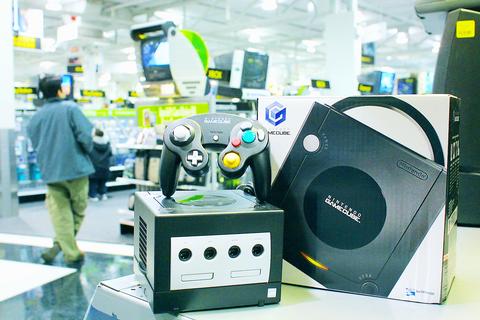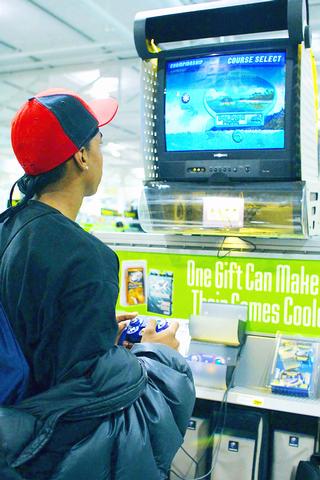Macronix International Co (
"We'll ship more unit devices to their box," Macronix Chairman Miin Wu (
Taiwan's fourth-largest chipmaker will supply more than the 8 million flash-memory chips it shipped last year to Nintendo as monthly sales of the GameCube, which debuted in the US in November, rise to 2 million units, Wu said.

PHOTO: BLOOMBERG
Some investors don't share Wu's optimism, saying they expect the second-largest video-game maker to use other memory-storage devices for the GameCube.
"We've been among the doubters," said Albert King, who manages US$857 million in equities for HSBC Asset Management Taiwan Ltd and has sold Macronix shares. "The GameCube will use DVD disks more for storage and that may have an impact on Macronix's sales of chips to Nintendo."
Macronix turned to a fourth-quarter loss of NT$3.3 billion (US$94 million) from a profit of NT$5 billion a year ago in part because Nintendo halted orders to Macronix to reduce inventory related to consoles it is phasing out, Wu said. Sales fell 64 percent to NT$4.3 billion.

PHOTO: BLOOMBERG
Macronix makes flash-memory chips, which store software in games and other consumer electronics until it is erased or upgraded, as well as other types of memory chips that store content permanently.
Japanese customers accounted for 61 percent of Macronix's sales in the fourth quarter, compared with 69 percent in the third quarter, the company said. Fourth-quarter sales fell 14 percent from NT$5 billion in the third quarter.
"Normally, we expect great sales in the fourth quarter," Wu said.
Wu said he expects Macronix's Japanese customers to be conservative in their purchases during the first quarter as they approach the end of their fiscal year in March.
Kyoto-based Nintendo's game machine debuted in Japan in September. Nintendo sold a better-than-planned 1.4 million GameCube consoles in the US by the end of December, and 1.3 million in Japan, it said.
Wu declined to forecast sales or profit numbers, citing a mandatory quiet period following the company's issue of bonds convertible into shares.
The sale will fund equipment for a new chip plant.

BYPASSING CHINA TARIFFS: In the first five months of this year, Foxconn sent US$4.4bn of iPhones to the US from India, compared with US$3.7bn in the whole of last year Nearly all the iPhones exported by Foxconn Technology Group (富士康科技集團) from India went to the US between March and last month, customs data showed, far above last year’s average of 50 percent and a clear sign of Apple Inc’s efforts to bypass high US tariffs imposed on China. The numbers, being reported by Reuters for the first time, show that Apple has realigned its India exports to almost exclusively serve the US market, when previously the devices were more widely distributed to nations including the Netherlands and the Czech Republic. During March to last month, Foxconn, known as Hon Hai Precision Industry

Taiwan Semiconductor Manufacturing Co (TSMC, 台積電) and the University of Tokyo (UTokyo) yesterday announced the launch of the TSMC-UTokyo Lab to promote advanced semiconductor research, education and talent development. The lab is TSMC’s first laboratory collaboration with a university outside Taiwan, the company said in a statement. The lab would leverage “the extensive knowledge, experience, and creativity” of both institutions, the company said. It is located in the Asano Section of UTokyo’s Hongo, Tokyo, campus and would be managed by UTokyo faculty, guided by directors from UTokyo and TSMC, the company said. TSMC began working with UTokyo in 2019, resulting in 21 research projects,

Ashton Hall’s morning routine involves dunking his head in iced Saratoga Spring Water. For the company that sells the bottled water — Hall’s brand of choice for drinking, brushing his teeth and submerging himself — that is fantastic news. “We’re so thankful to this incredible fitness influencer called Ashton Hall,” Saratoga owner Primo Brands Corp’s CEO Robbert Rietbroek said on an earnings call after Hall’s morning routine video went viral. “He really helped put our brand on the map.” Primo Brands, which was not affiliated with Hall when he made his video, is among the increasing number of companies benefiting from influencer

Quanta Computer Inc (廣達) chairman Barry Lam (林百里) yesterday expressed a downbeat view about the prospects of humanoid robots, given high manufacturing costs and a lack of target customers. Despite rising demand and high expectations for humanoid robots, high research-and-development costs and uncertain profitability remain major concerns, Lam told reporters following the company’s annual shareholders’ meeting in Taoyuan. “Since it seems a bit unworthy to use such high-cost robots to do household chores, I believe robots designed for specific purposes would be more valuable and present a better business opportunity,” Lam said Instead of investing in humanoid robots, Quanta has opted to invest